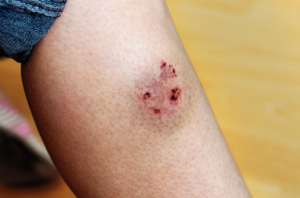How Long After a Dog Attack Can You Sue?
How Long After a Dog Attack Can You Sue?
Dog attacks can be traumatic experiences that leave victims with physical injuries, emotional scars, and financial burdens. In the aftermath of such an incident, many people wonder about their legal options and how long they can pursue a lawsuit.
Below, we’ll explore the timeframes for filing a dog bite lawsuit, factors that can affect your case, and why it’s important to act promptly. We’ll also discuss the role of a Riverside dog bite attorney in helping you seek the compensation you deserve.
Schedule a Free Initial Consultation Today!
Understanding the Statute of Limitations
 One of the most important concepts to understand when filing a lawsuit after a dog attack is the statute of limitations. This legal term refers to the time limit in which, a person must initiate legal proceedings. The statute of limitations varies depending on the type of case and the jurisdiction in which it occurs.
One of the most important concepts to understand when filing a lawsuit after a dog attack is the statute of limitations. This legal term refers to the time limit in which, a person must initiate legal proceedings. The statute of limitations varies depending on the type of case and the jurisdiction in which it occurs.
In most states, the time limit for filing a personal injury lawsuit ranges from one to six years from the date of the incident. However, it’s important to note that this timeframe can vary significantly from state to state. A skilled dog bite attorney can help you determine the statute of limitations for your particular incident.
It’s worth noting that there are some exceptions to these general rules. For instance, if the victim is a minor at the time of the attack, the statute of limitations may be extended. In many jurisdictions, the clock doesn’t start ticking until the minor reaches the age of majority (usually 18 years old). This provision ensures that young victims have a fair opportunity to seek justice once they’re old enough to make legal decisions for themselves.
The Role of a Dog Bite Lawyer
Given the issues involved in dog bite cases and the importance of timely action, many victims choose to work with a dog bite lawyer in Riverside. A dog bite attorney can provide valuable assistance throughout the process, from initial consultation to final resolution.
A dog bite attorney can help you understand your rights and the laws that apply to your case. An attorney can explain the statute of limitations in your jurisdiction and determine the best course of action based on your unique circumstances.
One of the primary functions of a dog bite lawyer is to gather and preserve evidence. This can include collecting police reports, medical records, witness statements, and photographic evidence. Your attorney may also work with expert witnesses, such as medical professionals or animal behaviorists, to build a strong case on your behalf.
Dealing with insurance companies can be challenging, especially when recovering from a traumatic experience. A dog bite attorney can handle all communications with insurance adjusters, ensuring that your rights are protected and that you don’t inadvertently say or do anything that can harm your case.
In many cases, dog bite claims can be resolved through negotiation and settlement without going to trial. A skilled dog bite lawyer can assess the value of your claim and negotiate with the opposing party to secure a fair settlement. If a satisfactory agreement can’t be reached, they can prepare your case for trial and represent you in court.
Understanding Damages in Dog Bite Cases
It’s important to understand the types of damages you can recover. This understanding can help you make informed decisions about whether and when to pursue legal action.
- Medical Expenses: One of the most straightforward damages in dog bite cases is medical expenses. This can include costs for emergency treatment, surgeries, medications, physical therapy, and any ongoing medical care related to the attack. It’s important to keep detailed records of all medical treatments and expenses.
 Lost Wages: If your injuries from the dog attack caused you to miss work, you can recover compensation for lost income. This can include the time immediately following the attack and any future loss of earning capacity if your injuries have long-term effects on your ability to work.
Lost Wages: If your injuries from the dog attack caused you to miss work, you can recover compensation for lost income. This can include the time immediately following the attack and any future loss of earning capacity if your injuries have long-term effects on your ability to work.- Pain and Suffering: Unlike medical expenses and lost income, pain and suffering damages are more subjective. These non-economic damages are intended to compensate you for the physical pain and emotional distress caused by the attack. The amount awarded for pain and suffering can vary widely depending on the severity of the attack and its impact on your life.
- Property Damage: If your personal property was damaged during the dog attack (such as clothing, jewelry, or electronic devices), you can claim compensation for repair or replacement costs.
- Scarring and Disfigurement: Dog bites can often leave visible scars, which can have both physical and emotional impacts. Compensation may be available for the cost of scar revision surgeries and for the emotional distress caused by permanent disfigurement.
- Psychological Trauma: Dog attacks can be terrifying experiences that leave lasting psychological scars. Many victims experience anxiety, depression, or post-traumatic stress disorder (PTSD) following an attack. Compensation may be available for psychological counseling and therapy to address these issues.
- Punitive Damages: In some cases, particularly those involving extremely reckless or intentional behavior on the owner’s part, punitive damages may be awarded. These punish the wrongdoer and discourage similar behavior in the future.
Understanding the potential damages can help you assess the value of your case and determine whether it’s worth pursuing legal action, especially as time passes after the attack.
The Legal Process for Dog Bite Cases
When considering how long after a dog attack you can sue, it’s helpful to understand the general timeline of the legal process. While every case is unique, most dog bite lawsuits follow a similar pattern:
- Initial Consultation: The process typically begins with an initial consultation with a dog bite attorney. During this meeting, you’ll discuss the details of the attack, your injuries, and your legal options.
- Investigation: If you decide to proceed, your lawyer will begin a thorough investigation. This may involve gathering police reports, medical records, and witness statements.
- Demand Letter: Once sufficient evidence has been gathered, your lawyer may send a demand letter to the dog owner or their insurance company. This letter outlines your case and demands compensation for your damages.
- Negotiation: In many cases, the demand letter leads to negotiations with the insurance company. Your lawyer will work to secure a fair settlement that covers all of your damages.
- Filing a Lawsuit: If a satisfactory settlement can’t be reached through negotiation, your lawyer may recommend filing a lawsuit. This must be done within the statute of limitations.
- Discovery: Both sides start the discovery process after the lawsuit is filed. Discovery involves exchanging info/evidence related to the dog bite. It may include written questions (interrogatories), requests for documents, and depositions (sworn out-of-court testimony).
- Mediation: Many courts require parties to attempt mediation before going to trial. This is a form of alternative dispute resolution where a neutral third party helps facilitate negotiations between the parties.
- Trial: If the case can’t be resolved through negotiation or mediation, it will proceed to trial. Both sides present their evidence and arguments to a judge or jury at trial, who then decides the outcome.
- Appeal: If either party is dissatisfied with the outcome of the trial, they may have the option to appeal the decision to a higher court.
Understanding this process can help you appreciate why acting promptly after a dog attack is important. Each stage takes time, and waiting too long to start the process can result in valuable evidence being lost or the statute of limitations expiring.
Common Defenses in Dog Bite Cases
As you consider how long after a dog attack you can sue, it’s important to be aware of common defenses that the dog owner or their insurance company might raise. Being prepared for these defenses can help you understand the importance of acting quickly and gathering strong evidence:
- Provocation: One common defense is that the victim provoked the dog. If the dog owner can prove that you teased, tormented, or abused the dog immediately before the attack, it can weaken your case.
- Trespassing: In many jurisdictions, dog owners are not liable if the victim was trespassing on their property at the time of the attack. However, there are exceptions, particularly for children who may not understand property boundaries.
- Assumption of Risk: If you were aware of the risk of being bitten and voluntarily exposed yourself to that risk, the dog owner might argue that you assumed the risk of injury.
- Lack of Knowledge: In some jurisdictions, dog owners may argue that they had no prior knowledge of their dog’s aggressive tendencies. This defense is more likely to succeed in states that follow the “one-bite rule.”
- Misidentification: The dog owner might argue that their dog did not attack you. This is why prompt reporting and thorough documentation of the incident are so important.
- Statute of Limitations: If you wait too long to file your lawsuit, the dog owner can argue that the statute of limitations has expired, potentially barring your claim entirely.
Being aware of these potential defenses underscores the importance of acting quickly after a dog attack. The sooner you consult with a dog bite lawyer, the better prepared you’ll be to counter these defenses and build a strong case.
The Impact of Local Laws on Dog Bite Cases
Local laws can significantly impact your case. Different states and even different municipalities within states may have varying laws regarding dog bites and owner liability.
Some jurisdictions follow a “strict liability” rule for dog bites. Under this rule, the dog owner is responsible for any injuries caused by their dog, regardless of whether they knew the dog was dangerous or took reasonable precautions to prevent the attack. In strict liability states, proving your case may be more straightforward, which can influence your decision about when to take legal action.
Other areas follow the “one bite rule” or a negligence standard. Under the one-bite rule, the dog owner is only liable if they knew or should have known that their dog had aggressive tendencies. In negligence jurisdictions, you must prove that the owner failed to use reasonable care in controlling their dog. These standards can make cases more complex and time-consuming, emphasizing the importance of starting the legal process as soon as possible.
Some localities have specific ordinances related to dangerous dogs or certain breeds. These laws might impose additional responsibilities on dog owners or create presumptions of liability in certain circumstances. Understanding these local laws can be key to building a strong case.
 It’s also worth noting that some jurisdictions have specific notice requirements for claims against municipalities. If the dog that attacked you belonged to a city or was on city property, you might have a much shorter window to provide notice of your claim – sometimes as little as 30 to 90 days.
It’s also worth noting that some jurisdictions have specific notice requirements for claims against municipalities. If the dog that attacked you belonged to a city or was on city property, you might have a much shorter window to provide notice of your claim – sometimes as little as 30 to 90 days.
Given these variations in local laws, it’s important to consult with a dog bite lawyer who is familiar with the specific regulations in your area. They can help you understand how local laws might affect your case and advise you on the best timing for taking legal action.
Reach Out to a Qualified Dog Bite Lawyer
If you’ve been the victim of a dog attack, don’t let uncertainty about timelines or legal processes prevent you from exploring your options. Contact a qualified dog bite lawyer in your area for a consultation. Most offer free initial consultations, giving you the opportunity to understand your rights and potential courses of action without any financial commitment.
Remember, consulting with a lawyer doesn’t obligate you to file a lawsuit. Navigating the complexities of dog bite law can be overwhelming. A consultation with a skilled dog bite attorney, simply allows you to make an informed decision about how to proceed. A knowledgeable Riverside dog bite lawyer can help you understand the strength of your case, the potential timeline, and also what to expect from the legal process.
Don’t let time slip away. If you have suffered an injury from a dog bite, take the first step towards understanding your rights and options today. Your path to recovery – both physical and financial – may depend on it.


